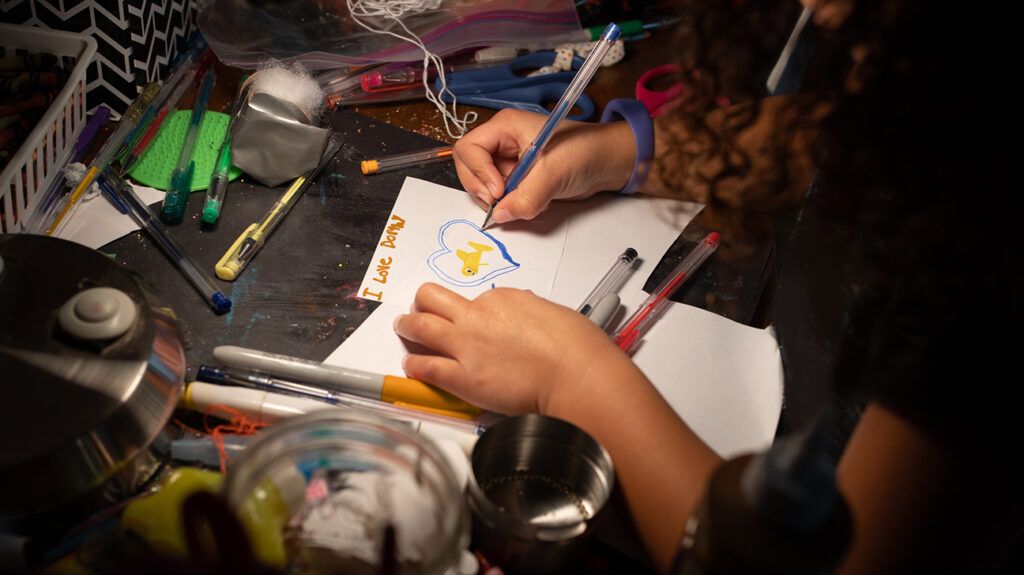When a pet dies, it can feel heartbreaking for your child. But there are several ways to help them cope.

Each child processes grief differently.
Though it’s painful, the loss of a pet can be an important opportunity to help children learn how to handle difficult experiences.
A combination of talking about the death and closure activities can help you and your child heal.
Children of all ages benefit from a timely, straightforward explanation, says Katie Lear, a licensed therapist based in Charlotte, North Carolina, and author of the book “A Parent’s Guide to Managing Childhood Grief: 100 Activities for Coping, Comforting, & Overcoming Sadness, Fear, & Loss.”
Lear says it’s best to use direct language like “died” or “body stopped working” over euphemisms like “put to sleep” or “crossed the rainbow bridge.”
“While these phrases sound softer, they can be confusing and potentially frightening for kids,” she explains. “Young children tend to take things literally, and may wonder if something bad might happen to them, too, the next time they’re tucked in to sleep.”
Lear suggests something like this:
| Cause | “Buddy had a sickness called cancer that made him feel bad. He was weak and lost weight because fighting cancer used up his energy. Eventually, his heart stopped beating. When that happens, a pet dies.” |
|---|---|
| Clarity | “You can’t catch cancer from people or pets.” |
| Facts | “When a pet dies, its body stops working. It can’t think, feel, or move. It isn’t in pain anymore. Buddy is not going to come home with us.” |
What about euthanasia?
If your pet was euthanized, you can share that as well, says Lear. “Otherwise, children may hold on to anger or guilt, and worry that they should have done something more to help their pet.”
Lear suggests this template:
“When a pet is in pain, that’s stressful for it. A vet can give it a special medicine to help them fall asleep and make their heart stop beating once they sleep. This is very different from regular sleeping, and it doesn’t hurt them.”
If possible, try to pair honest conversations with closure activities.
1. Consider a creative outlet
A small 2020 study showed that art therapy can help children grieve.
“It’s important to find age-specific creative outlets to encourage them to express how they’re feeling,” says Albert Nguyen, a licensed psychotherapist in Palo Alto, California. “Children grieve differently and may not be able to express using words alone.”
Some ideas include:
- drawing
- music
- poetry
- play dough
- scrapbooking
- writing
2. Try grief-related books
Books can help facilitate a dialogue around death.
Some helpful titles may include:
- “Goodbye, Mousie” by Robert H. Harris
- “Ida, Always” by Caron Levis
- “I Miss You: A First Look at Death” by Pat Thomas
- “Lifetimes” by Bryan Mellonie and Robert Ingpen
- “Remembering Blue Fish” by Becky Friedman
- “Something Very Sad Happened” by Bonnie Zucker
- “The Memory Box: A Book About Grief” by Joanna Rowland
- “The Tenth Good Thing About Barney” by Judith Viorst
- “When Children Grieve” by John W. James and Russell Friedman
3. Consider memorializing your pet
It may help children to have a personalized way to process their grief, says Nguyen.
“Even if there was an official funeral or ceremony, it may not be closure for them yet,” he says. “I always find it helpful to revisit the idea of developing a ceremony with the child later that is special and personal to them.”
Nguyen suggests:
- making a scrapbook
- creating a box of memories
- performing a candlelit ceremony
- planting a tree
- releasing a sky lantern
- sending off a balloon
- writing a letter
At any age, death can be a difficult concept to grasp.
It can be particularly challenging for children under
The way your child reacts will depend on many factors, including:
- age
- attachment to the pet
- developmental level
- experience with loss
“It’s important not to force anything, but do try to encourage the grieving process so it’s not bottled up or buried inside,” says Nguyen.
“It’s uncomfortable to see someone in emotional pain, especially a child. But this is an important process that they must go through. It has the capacity to help them cultivate emotional intelligence and awareness that will be highly useful in the future,” he says.
Facing loss can be a hard yet important step in a child’s developmental process.
You can help facilitate this by openly talking with them about death, reading books together, and encouraging expression through art and a special ceremony.
If your child has a difficult time coping with the loss, you may find it helpful to reach out to a therapist who specializes in grief and working with children.
